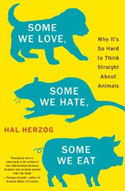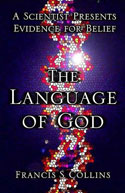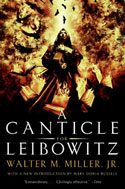Arts & Culture Faithful Creativity
Response Readings
Have you read any good books that relate to science — fiction or nonfiction? Here are a few recommendations from members of the SPU community. Offer your own suggestions to fellow Response readers below.
 Some We Love, Some We Hate, Some We Eat: Why It’s So Hard to Think Straight About Animals
Some We Love, Some We Hate, Some We Eat: Why It’s So Hard to Think Straight About Animals
Hal Herzog
Riverhead, 2007
Is it wrong to feed kittens to boa constrictors? Do dolphins make good therapists?
What is it like to be a spider? Hal Herzog, a scientist who studies human-animal relations, poses these questions, and more, to examine the inconsistent and often paradoxical way we think, feel, and behave toward animals.
Through a combination of research and real-life anecdotes, he challenges the reader to look anew at how we love puppies, hate snakes, and enjoy the taste of Copper River salmon, and he does so with humor and heart.
Gary Fick, Science and Psychology Librarian
 The Language of God: A Scientist Presents Evidence for Belief
The Language of God: A Scientist Presents Evidence for Belief
Francis Collins
Free Press, 2006
At the top of his profession in biology, Francis Collins, who is the former director of the Human Genome Project and the current director of the National Institutes of Health, shares his spiritual and scientific journeys, raising the ultimate questions of life and finding answers in Jesus Christ and his creation.
Maintaining complete intellectual honesty, he demonstrates that Christianity and science are not conflicting but complementary. Collins gives scientific insights into the greatness of God, transcending those we have had in the past, but requiring greater care and thoroughness in biblical interpretation.
Karl Krienke, Professor Emeritus of Physics and Mathematics
 A Canticle for Leibowitz
A Canticle for Leibowitz
Walter M. Miller
First printing, 1959
In this novel, global nuclear war has plunged the world into another Dark Ages; neo-medieval monks jealously guard humanity’s surviving scientific knowledge, illuminating documents they only dimly understand. Though it was written during the Cold War, the novel’s tensions remain contemporary: the benefits vs. the costs of scientific progress (think Japan’s nuclear crisis), protecting vs. sharing information (think WikiLeaks), and political vs. ecclesiastical power.
As it vividly explores the relation between body and soul — especially in cases of physical suffering — and the conflicts among faith, doubt, and empirical knowledge, Canticle raises challenging questions without easy answers.
April Middeljans, Assistant Professor of English
Share Your Recommendations!
What science-related books — fiction or nonfiction — do you recommend to fellow readers? Read what others suggest, too.
